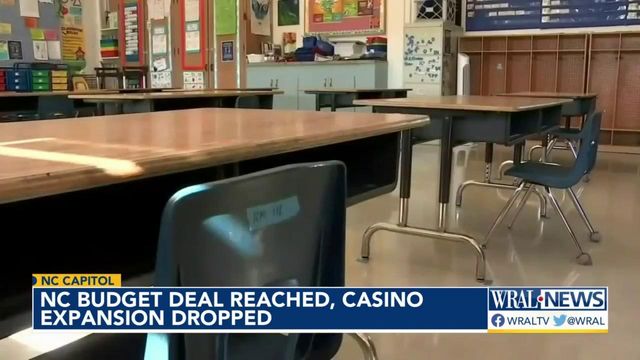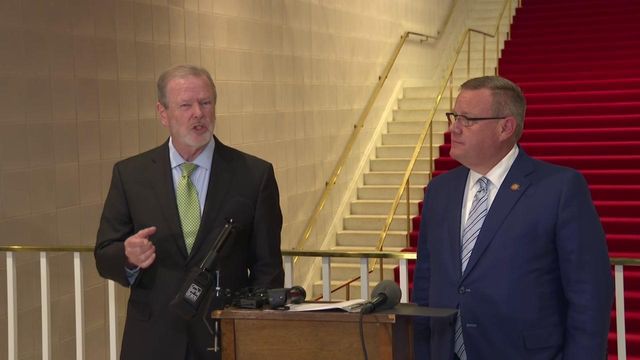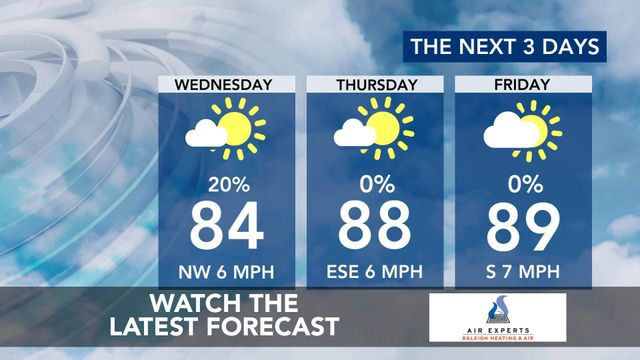State budget deal won't include casinos, video lottery terminals, lawmakers say
North Carolina lawmakers reached a budget deal Tuesday, agreeing to remove from the $30 billion state spending plan a divisive proposal to expand gambling across the state.
Lawmakers in the GOP-controlled state House and Senate had been at an impasse over provisions that would have legalized video lottery terminals and allowed for several casinos off tribal lands. The disagreement made it impossible for Republicans to finalize the budget despite holding veto-proof supermajorities in both chambers.
The stalemate in recent days threatened the implementation of Medicaid expansion, a longtime policy goal of Democrats that had gained Republican support this legislative session. Medicaid expansion, which Republicans considered removing from the budget, will again be included in the plan. Votes are expected to be taken later this week.
Senate leader Phil Berger, R-Rockingham, the chief driver of the casino proposal, on Tuesday agreed to move forward on the budget, which is stuffed with Republican priorities, without language to expand gambling.
“This budget has thousands of great things for the people of North Carolina,” Berger said.
Agreement on the budget would allow expected pay raises for state workers and teachers, plus tax cuts and millions in spending projects across the state, to move ahead.
"It's my belief that the emotion got the better of the discussion, and it was just time for us to get the other things taken care of," Berger said Tuesday night at a joint press conference with House Speaker Tim Moore. "Like the Speaker said, this budget has thousands of great things for the people of North Carolina."
The House and Senate plan to vote Thursday and Friday on the budget. Berger and Moore said Tuesday that they expect it to pass with the support of all Republicans and some Democrats.
Moore said last week that while a majority of Republicans in the House supported the casino proposal, he didn't have enough overall votes to pass the budget with casinos included. That earned an angry rebuke from Berger, who accused Moore of breaking an agreement to include any provision with majority Republican support in the budget.
But with some Republicans and most Democrats lining up against casinos — even when it was briefly tied to Medicaid expansion — there was no way out. Medicaid expansion is expected to deliver health insurance to more than 500,000 of the state's working poor and bring billions in federal dollars.

Berger bemoaned the lost opportunity to promote rural development in economically distressed counties given that the casino proposal, dubbed rural tourism districts, would have required a $500 million investment at sites in places such as Anson, Nash and Rockingham counties. Some statewide Republican candidates, outside groups and even local lawmakers had come out against the casinos.
"It was just pretty clear that the facts were almost beside the point as to what those proposals would do for rural areas and the emotion that was actually permeating every bit of discussion about that had sort of overtaken," Berger said. "I've learned that in an environment like that you're unlikely to make any progress."
Republican leaders said they would release the budget Wednesday. WRAL obtained an advance copy of a budget draft Monday.
The draft budget bill includes some gambling language, not related to casinos or video lottery terminals but representing a major rewrite of the state’s new sports betting laws to give North Carolina sports teams more power. The language would overhaul gambling legislation signed into law in June, which hasn’t yet been put into practice.
Moore stressed there would be some changes in the final bill while negotiators were signing off on a final version Tuesday.
"We felt like this issue, and no one single issue, should hold up a budget," Moore said.
Budget bill
The fight over casinos had become the main discussion surrounding the budget, which is months overdue, and pitted Republicans against each other in a year when the GOP won significant policy victories on abortion, transgender issues and the budget itself. The state's fiscal year began July 1.
"It's appropriate that we're now able to transition and talk about what a great budget this is, what it's going to do for North Carolinians from one end of the state to the other," Moore said.
The two-year budget legislation includes an average 4% pay raise in current fiscal year, which began July 1, and 3% in the next fiscal year for teachers and state employees. Raises will be retroactive to the beginning of the fiscal year, Moore said previously.
That's significantly less than Democratic Gov. Roy Cooper, the State Employees Association of North Carolina and teachers groups had asked for.
SEANC Executive Director Ardis Watkins said the decision ignores the state government hiring and retention difficulties that led to historic vacancy rates.
"Agency heads from both political parties have spoken out," Watkins said. "To ignore these leaders when the state has sufficient funds to give a proper raise and a meaningful bonus is ironically at the peril of the very citizens whose tax dollars fund the state budget."
Moore said he would have liked to see higher raises, and the House's budget called called for larger increases.
"This was a compromise position that we took with the other chamber," he said.
The budget bill would boost the state’s school voucher program, called Opportunity Scholarships, by hundreds of millions of dollars, something Cooper and other Democrats have adamantly opposed, saying it soaks up money needed by public schools. It would also open the program to every family in the state instead of capping the vouchers based on income.
By 2031 the program would grow to more than $500 million a year under the proposed budget.
The bill would accelerate already planned state income tax cuts, which was a top priority for Senate Republicans, though those cuts are limited in the measure by revenue triggers that House Republicans wanted.
The plan is to take the current 4.75% personal income tax rate — a flat rate paid by anyone making more than $12,750 a year as a single person or $25,500 for married couples — down as far as 2.49%.
The triggers were an important victory in negotiations for the House.
"The House position was: We wanted to see continued tax relief as well, but we wanted to make sure there were protections in case you ran into a situation where you had a potential shortfall," Moore said. "That was a key sticking point and, frankly, one of the things that kept us here for a while."
Berger said getting the tax cuts written into statute was an important victory for his caucus.
The budget would also cap the state's franchise tax, which businesses pay. It also includes several tax exemptions for industries, including expansions of incentives for the aviation and boating industries.
The bill also includes a new tax, between 1% and 1.5%, on ride-share services such as Uber and Lyft.
The proposal calls for $500 million, split over two years, to fund NCInnovation, an attempt to boost economic development around state universities by helping researchers turn ideas and discoveries into successful businesses. The influential group behind the idea had asked for a $1.4 billion endowment, and the group’s chief executive called that the “minimally acceptable amount,” but that proved too big an ask for many lawmakers.
"We all realize this is an opportunity for a great project with great business leaders to try to recruit and keep the intellectual property that is developed in North Carolina," Moore said.
Other Republican priorities
The bill includes a laundry list of Republican policy changes, many of them debated previously this legislative session, some of them emerging now.
- The bill raises the retirement age for judges on the state Supreme Court and Court of Appeals from 72 to 76, a change that would allow Republican Supreme Court Chief Justice Paul Newby, a Republican, to stay on the bench longer. Supreme Court justices are elected, and the change would help protect the court's 5-2 Republican majority.
- It would let state Supreme Court justices and Court of Appeals judges carry concealed weapons in court, a right already afforded to judges sitting in the state’s district and superior courts.
- The measure overhauls the Judicial Standards Commission, which investigates and disciplines judges, removing the State Bar Council’s appointment authority and giving those four appointments to the legislature’s Republican majority. State Rep. Marcia Morey, a Durham Democrat and retired judge, called the change “a huge concern.” The commission already is embroiled in controversy over its investigation of Supreme Court Justice Anita Earls, one of the high court’s two Democratic justices. Earls filed a federal lawsuit over the inquiry, saying she’s been targeted by the body in a way that violates her First Amendment rights.
- The legislature would get new authority over the state’s community college system through a number of governance changes, including a new requirement that the system president be confirmed by the General Assembly. Currently the system board makes that hire. This is one of several power shifts the legislature’s Republican leadership has contemplated this session.
- This budget would beef up the General Assembly’s Joint Legislative Commission on Governmental Operations, giving it more power to investigate the executive branch by providing new access and requiring state employees approached by commission staff to keep it a confidential or potentially be fired. On social media, Cooper spokesman Ford Porter denounced this section as “legislative secret police.”
- There’s a measure in the bill forbidding local governments from restricting the use of plastic bags at grocery stores, and from levying fees for plastic bags.
- There's language prohibiting state agencies and local governments from demanding employees get a COVID-19 vaccination, except for hospitals and other facilities that have to require it to qualify for federal funding. The budget would also prohibit schools and colleges from requiring the vaccine.
- New limits on the North Carolina Lottery's ability to offer casino-style online games, a concern that emerged after the Lottery Commission in August OK'd the sale of digital instant games beginning in November. Berger said lawmakers worry the commission's decision "might actually provide folks with basically a casino on their phone."











